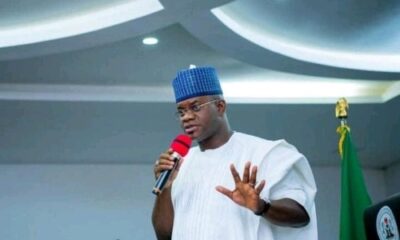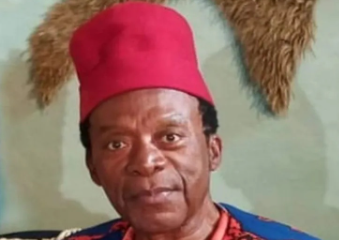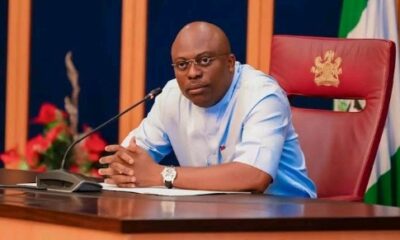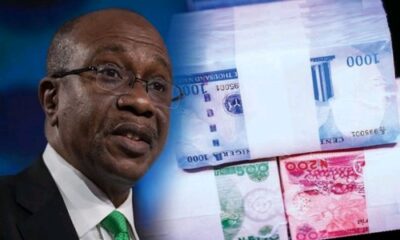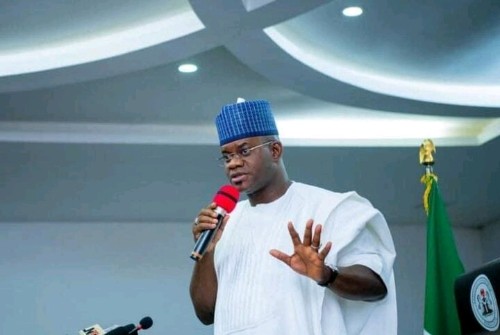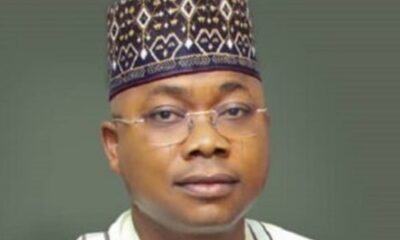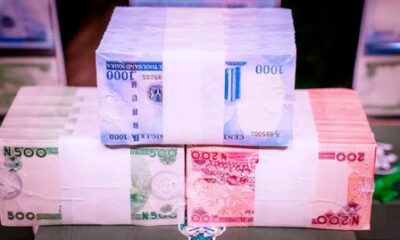The media office of Yahaya Bello says the former governor of Kogi state was never invited by the Economic and Financial Crimes Commission (EFCC).
In a statement signed by Ohiare Michael, Bello’s media office said the anti-graft agency declared the former governor wanted without sending an invitation his way.
The statement added that Bello is not afraid of the EFCC.
It was earlier reported that the EFCC is accusing the former governor of involvement in the laundering of N80.2 billion belonging to the Kogi government.
On April 17, EFCC operatives laid siege on Bello’s Abuja residence in a bid to arrest him.
While the operatives were at Bello’s residence, Usman Ododo, governor of Kogi, arrived at the scene.
Shortly after Ododo left the residence, the EFCC operatives ended their siege.
Bello was believed to have been rescued from his residence by Ododo.
Amid the drama, the Kogi high court delivered judgment in a fundamental rights enforcement suit, restraining the commission from “harassing, threatening to arrest or detaining” the former governor.
On the same day, the EFCC obtained a warrant of arrest against Bello from a federal high court in Abuja.
Subsequently, the anti-graft agency declared the former governor wanted, while the Nigeria Immigration Service (NIS) placed Bello on a watchlist.
In the statement, Michael said Bello is not a fugitive running from the law.
“Let it be known to all that Alhaji Yahaya Bello is not afraid of the EFCC, he is not a fugitive running from the Law. All he demands is that the rule of law be respected!!,” the statement reads.
Recall that the EFCC, in a statement on Monday, said Bello was invited when his tenure ended but he refused to honour the invitation.
On April 23, Ola Olukoyede, EFCC chair, said he invited Bello to his office for a dignified interrogation.
Olukoyede said Bello turned down the invitation and requested operatives to come to his village instead.
The media office dared the anti-graft agency to prove that Bello was ever invited.
“The EFCC stated that they invited Alhaji Yahaya Bello immediately after his tenure ended on the 27th of January 2024. We challenge the EFCC to publish a copy of the invitation delivered to Yahaya Bello,” the statement reads.
“They should also tell Nigerians the date the alleged invitation was delivered and who it was delivered to. We are certain that the EFCC will not be able to produce any of the foregoing as to date, they have yet to invite Alhaji Yahaya Bello.
“Indeed, just about the end of his administration, several online news sites published that the EFCC would arrest the Governor as soon as he handed over power to his successor as they intended to charge him for alleged crimes committed as Governor of Kogi State.
“True to the stories, the EFCC on the 5th day of February 2023 in an ongoing trial of other persons, in Charge No. FHC/ABJ/CR/550/22 before Honourable Justice J.K. Omotosho of the Federal High Court, Abuja Division, amended the Charge to include in Count 1 thereof, the allegation that Yahaya Bello conspired with others, including a Kogi State Government House Cashier, in September 2015, to convert the sum of 80 Billion.
“The news of the inclusion of his name in the Charge as usual was given wide publicity by the EFCC who still had not invited him but had described him as being at large.
“It was thus clear from the foregoing that the EFCC was out for mischief. A stage was being set to move in a gestapo manner to his home, lay siege there and violently arrest him with the aim of tarnishing his name and ruining his reputation as if he were a fugitive even though he was not invited.”
Michael accused the EFCC of violating the court order barring the agency from harassing the former governor.
“For the protection of his reputation, rights to presumption of innocence, liberty, and dignity of the human person, Alhaji Yahaya Bello, as a Law abiding Citizen, caused to be filed a Fundamental Rights Enforcement action in Suit No. HCL/68M/2024 between Alhaji Yahaya Bello v. Economic and Financial Crimes Commission on the 8th day of February 2024, at the High Court of Justice, Kogi State,” the media office said.
“The belief of the imminent dramatic arrest, which eventually occurred on the 17th of April 2024 in Abuja, was indeed predicted in paragraph 36(c) of the Affidavit in Support of the Originating Summons filed on the 8th of February 2024.
“Upon the above facts, particularly that he was to be investigated, invited, arrested, or prosecuted on an impossible allegation, the High Court granted him reprieve by restraining the EFCC from inviting, arresting, and prosecuting him, pending the determination of the Originating Motion for the enforcement of his fundamental rights. The said Order was served on the EFCC on the 12th day of February 2024.”







